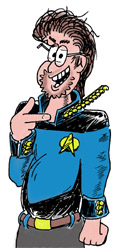Wednesday, August 20, 2008
Intrepid: Sisters
Micheal Hudson thought it would make a good audio drama and made an attempt to convert it, before realising that it might not be that straightforward. Almost the entire thing was either some visual imagery or else internal character thoughts; not something lending itself to audio very easily.
So I've been rewriting it, in some places quite substantially, to fit the new form. A narrator has been added for some of the exposition, while the remainder has been changed into dialogue divided between the characters. In some cases, new characters. It was an interesting experiment and now that it's in Micheal's hands I've promised to be hands-off while he gets it made.
That last part might be tricky - I can't help wanting to do everything!
Monday, August 11, 2008
Edinburgh Book Festival
The wrong seat, of course, was any seat that was not immediately adjacent to Iain Banks (famous Scottish author). Lesley happens to like Iain Banks (famous and clever Scottish author) a lot. So that was why the minutes leading up to Dawkin's talk consisted of observations of the form "Iain's taking his coat off", "Iain's looking around" and "Iain's looking at me!!!" (Disclaimer: Lesley is normally very *non-starstruck* and independent.)
The talk proved to be an interview chaired by Paula Kirby (famous, er, non-famous? I really have no idea) who started off by telling us that we'd be going into some less-travelled questioning. Most of the questioning stemmed from Richard's views on aliens, which itself came from an earlier debate in which he'd been consistently misrepresented. Even though it was outside his normal area of expertise, he spoke lucidly and at one point I wondered what must have been going through Iain Banks mind (famous clever Scottish Science Fiction author) as Richard explained that any real aliens would be vastly different in form to the old humanoid shape. Most science fiction writers don't have their aliens as being anything other than humanoid.
I wonder if Richard has read The Algebraist... but then Iain is most definitely not most science fiction writers. (Iain's giving his own talk on Wednesday, I'll have to ask him his thoughts - if I'm brave enough.) Dawkins is not most science fiction writers either; he revealed that his own story about aliens on the moon didn't follow the usual SF convention of having them speak English - the spoke French. But then he was seven at the time.
Most of the rest of the talk continued in on this theme, with a discussion of the Earth as a likely place for life and of multiverses. It was an unexpected avenue, and something which I am more familiar with than I would have been with biology. Of course it was all discussed with reference to scientific explanation versus "God did it", the result being entirely fascinating, even mentioning Fermi's Paradox. At that point I couldn't help thinking how amazing a discussion between Richard Dawkins and Stephen Baxter (another famous science fiction author) might have been.
Myself and Lesley were half expecting Iain to ask a question during the subsequent Q&A, but he remained silent. I thought that the questions from the audience were rather more interesting (and of course wider ranging) that Paula's questions, which really just stuck to the same theme.
So I'm blogging this from a pub a few streets down from the book festival and there's a lot of events still to go this week, including one about blogging.
Friday, August 08, 2008
Doritos in Space
The notion of using space for advertising isn't a new one. The Last Action Hero was briefly featured on the side of a NASA rocket launch, Pepsi was launched to Mir and Pizza Hut was on A Proton launch vehicle, amongst others. But with the latest ad effort, one has lurched into the entirely sinister.
Soon after NASA broadcast a Beatles song deep into space with a radio telescope, an advert for Doritos was broadcast in the same way. As far as any potential inhabitants of 47 Ursa Majoris are concerned, the first contact with humanity will be spam. Not content to merely pollute our own airwaves, we're exporting our pollution as far as we can possibly throw it across the universe. How noble.
Spamming would be grounds for an invasion all by itself, by any presumed civilisation. But then that is not the larger point that is being made. The very basic fact is that we have been making ourselves visible for some time now, but now we are doing it deliberately. As has been pointed out elsewhere on the net, were exposing ourselves to a something whose capabilities and intentions are unknown.
This is an extraordinarily dangerous thing to do. Even if the chances of the broadcast actually being picked up are vanishingly small, the potential consequences are immense. For example an event, such as a large asteroid hitting us, is unlikely but the result is catastrophic. Our Doritos advert has an even smaller chance of any consequences, but those consequences could be vastly greater.
We're conditioned by fiction to think of aliens as spanning the whole range of possible psychologies. Klingons are warriors who hold honour above all else, for a well-known example. But almost the entirety of alien depictions are variations of humans in one way or another. A truly alien psychology may act in ways we could barely comprehend. List all the SF battles between humans and aliens and the two sides are essentially pretty well matched. Any real encounter would have no such luxury.
In Stranger in a Strange Land, the Martians debate the artistic necessity of destroying Earth. Extraordinary. Yet in real human culture we have behaviours which are far stranger. Draw a cartoon with a particular subject matter and a sizeable section of humanity will call for your execution. And it hardly need be pointed out that after only a hundred years of technological progress we can destroy ourselves quite thoroughly. What can another civilisation do with a thousand years head start? Or ten thousand?
To reiterate; we are making ourselves known to possible aliens who may react in ways which cannot be known in advance. Whose intentions perhaps can't be known even in principle. Truly, we have no idea what we might be messing with.
They may think an interstellar Doritos advert to be funny. They may think it is the sign of an appallingly immature civilisation. Or they may merely see that a new technological culture has arisen – and move to eliminate it before it can become a threat. Or - and how humiliating this would be - we join the greater galactic community but are forever after treated as a joke, a third rate culture, because our first detectable broadcast was not about art or science or any of the things we supposedly hold to be important, but about crisps.
We can't know. And given the limitations of the speed of light, we won't know, though future generations may. Carl Sagan once asked who speaks for Earth. Well now we know the answer: a marketing executive.


